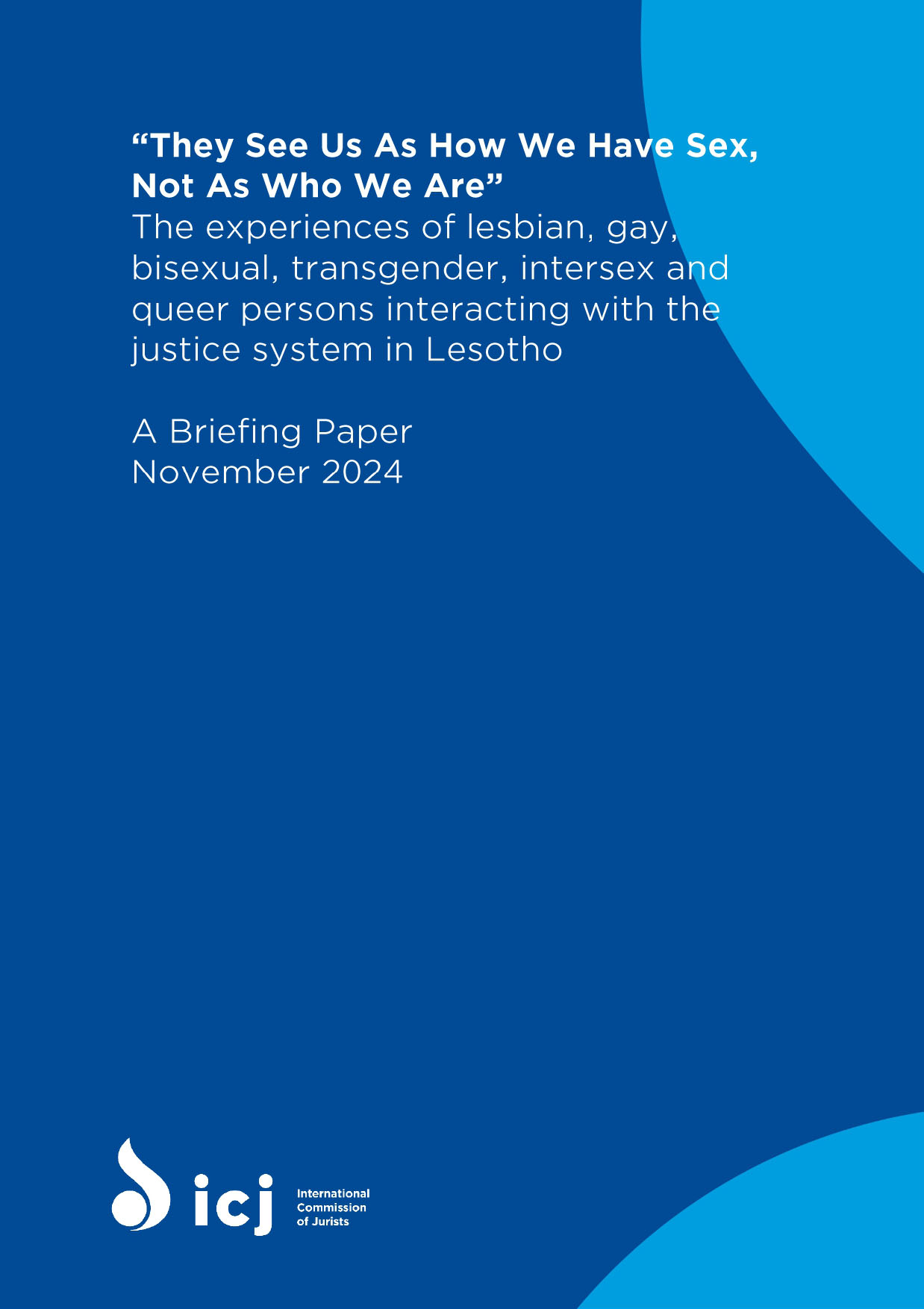Access to justice should be available to all individuals without discrimination, regardless of sexual orientation, gender identity, gender expression or sex characteristics (SOGIE-SC) but Lesotho is failing to fully comply with its international human rights obligations to ensure access to justice and effective remedies for all. A new briefing paper published by the International Commission of Jurists (ICJ) outlines some of the obstacles LGBTIQ+ people face in their access to justice and effective remedies and makes recommendations to the Lesotho authorities on how to address them.
The briefing paper uncovers and analyzes the predicaments that LGBTIQ+ persons may and do encounter when navigating the justice system in Lesotho. Significantly, LGBTIQ+ persons in Lesotho are subjected to many different forms of prohibited discrimination, including structural barriers to exercising their human rights, as well as harassment and abuse because of their real or imputed SOGIE-SC. Discriminatory, heteronormative and patriarchal societal norms in Lesotho have led to stigmatization, social and economic exclusion, violence and abuse against LGBTIQ+ persons, as well as the many human rights abuses they may experience when attempting to access justice when their rights have been violated.
“In a context of pervasive societal stigma, the briefing paper exposes the troubling reality of LGBTIQ+ individuals in Lesotho frequently facing discrimination and bias at various points in the justice system, ranging from their contact with the police to their experiences in the courts. The obstacles they face deter them from seeking legal recourse for violations of their human rights.
Their predicament is further exacerbated by inadequate legal protections and administrative inefficiencies within the justice system, among other problems, which contribute to a culture of impunity for acts of violence and discrimination against LGBTIQ+ persons” – ICJ Africa Director, Kaajal Ramjathan-Keogh
The paper details the following human rights concerns which have made interacting with the justice system extremely difficult for LGBTIQ+ persons in Lesotho:
- Violations of the human rights of LGBTIQ+ persons are not reported to the police and other authorities
- Cases are not properly identified, recorded and classified by the police as LGBTIQ-related, motivated by bias based on real or imputed SOGIE and/or as crimes targeting people based on SOGIE specifically
- An absence of a process for legal gender recognition for transgender and intersex persons can be a hindrance to accurate documentation of human rights violations against LGBTIQ+ individuals in Lesotho.
- There are inadequate laws and policies that protect LGBTIQ+ persons from discrimination and violence
- Discrimination perpetuated by laws regarding consensual same-sex sexual activity
- Many LGBTIQ+ persons are not accessing healthcare and legal services:
- LGBTIQ+ persons in Lesotho struggle to access legal services due to financial barriers, fear of being outed and limited knowledge of where to seek legal recourse.
- Cases are not investigated properly, do not reach the stage where they are prosecuted or may not reach courts due to dysfunctions in police departments or in the court system
- Bias or perceptions of bias in the judicial system.
The findings presented in this briefing paper are based on research conducted by the ICJ, including virtual and in-person interviews with human rights advocates and lawyers, as well as focus group discussions with LGBTIQ+ individuals in the Maseru and Leribe districts of Lesotho. These engagements were aimed at capturing first-hand experiences of the obstacles LGBTIQ+ persons have encountered when interacting with and attempting to access the justice system. Such obstacles, the focus group participants reported, hinder their ability to seek protection and redress for violations of their human rights, especially their rights to equality and non-discrimination and to lead a life free from violence.
The ICJ emphasizes that LGBTIQ+ persons must be able to report human rights violations without fear of retaliation or “outing” as LGBTIQ+; have access to legal representation in both civil and criminal proceedings; be empowered to vindicate their human rights when violated; and be able to access remedies through the courts.
“Lesotho must ensure that all individuals, regardless of their sexual orientation, gender identity or sex characteristics, can enjoy their rights to equality and non-discrimination, dignity, privacy, legal representation, legal aid and freedom of expression.”
“In compliance with Lesotho’s human rights obligations, this necessitates addressing the human rights concerns highlighted in the report in order to create a justice system that is inclusive and accessible to all.” – Mulesa Lumina, ICJ Africa Legal and Communications Officer.
Contact
Mulesa Lumina, ICJ Africa Legal and Communications Officer, e: mulesa.lumina@icj.org
Kaajal Ramjathan-Keogh, ICJ Africa Regional Director, e: kaajal.keogh@icj.org
Downloads

